Welcome to the hot water revolution!
Say goodbye to gas and go for efficient hot water solutions!
Australia is gradually shifting away from the traditional use of gas and electric hot water systems. This transition isn’t solely driven by environmental concerns but also by the soaring costs of gas and electricity, which threaten our overall quality of life.
While there are various alternative hot water solutions available, such as solar, evacuated tubes, and close-coupled systems, they do come with their own limitations. Solar panels, in particular, are increasingly occupying roof space, which can make these systems less appealing for heating our hot water.
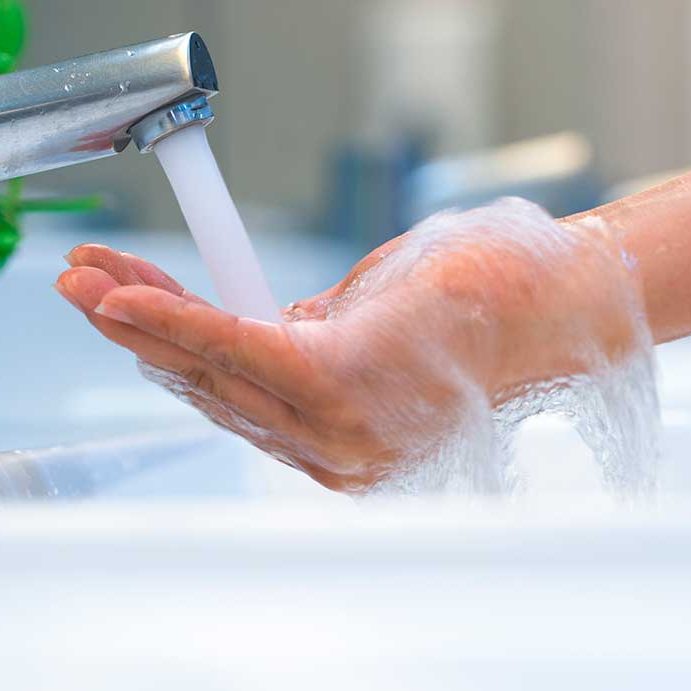
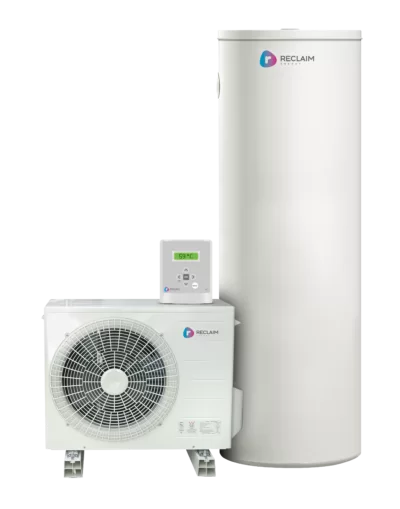
Introducing Reclaim Energy Heat pumps
Reclaim Heat Pumps have revolutionised the way we approach hot water solutions. Heat pumps had previously gained a negative reputation, often being installed in areas ill-suited for their technology, leading to inefficiency, noise, and unreliability. At one point, the Federal Government even removed them from their rebate scheme.
However, the game changed with Reclaim Energy Heat Pumps. Reclaim Energy, the sister company to our trusted solar hot water partner Apricus Australia, was at the forefront of this technological evolution. Knowing that the same level of quality and expertise backed this endeavor, we delved into the innovative CO2 Heat Pump technology.
Features of Reclaim Heat Pumps
- Average daily consumption of 3 kWh per day
- Operates effectively between -10ºC and 43ºC
- Estimated payback period of 3 years
- 315lt Tanks can be glass lined or stainless steel
- The quietest system on the market (Average noise: 37 dB) whisper quiet functionality
- Ozone friendly CO2 refrigerant
- Built-in frost control operation
- Built in legionella control operation
- Smart top down heating mechanism (faster hot water access and recovery)
The Reclaim energy CO2 Heat Pump controller makes monitoring and managing your energy simple. The interactive features enable you to individually customise how and when your hot water system works for you.
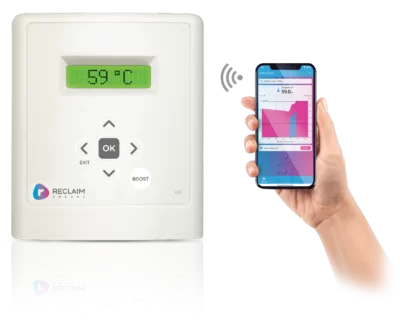
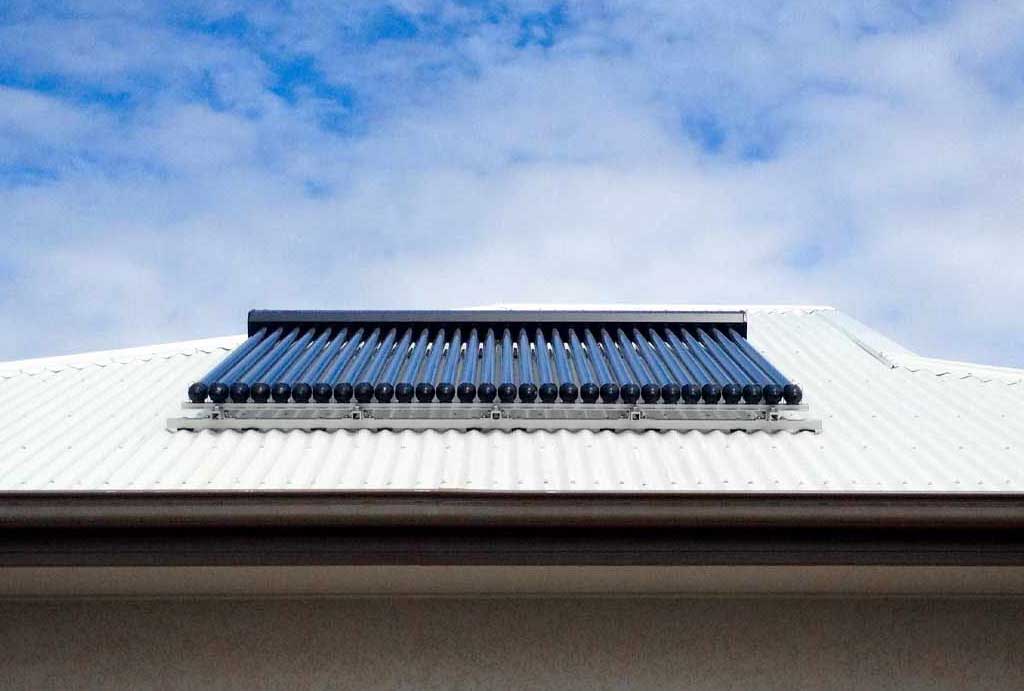
Apricus Solar Hot Water Systems
At Solar Integrity, we understand that each customer’s energy needs are unique, and we are dedicated to providing you with the ideal hot water solution. While we offer a range of alternative renewable energy options, we recognise that sometimes other solutions may not be the best fit for your specific requirements. In such cases, we proudly offer Apricus solar hot water systems as the alternative that can meet your needs when other options fall short.
In addition to our diverse energy offerings, we believe that Apricus solar hot water systems are a reliable choice when conventional hot water solutions aren’t suitable. Their efficiency, durability, and flexibility make them a compelling alternative, providing you with hot water that’s not only cost-effective but also eco-friendly. Our team of experts is ready to assist you in making the right choice, ensuring that your energy goals are met and that you have a hot water solution that suits your unique circumstances.
Features of Apricus All-In-One Heat Pump
- Reduce energy costs up to 3 times compared to conventional electric and gas water heaters.
- Registered Clean Energy product with annual carbon reduction rating of 3 tonnes.
- Real time power usage monitoring capability means households can now take control of their power bills.
- Integrate and maximise your PV with in-built timer controlled heat up cycles.
- Dual heating technology with incorporated electric element to provide hot water up to 70°c.
- Smart touch screen controller makes optimising the system easier than ever.
- R290 natural refrigerant with zero global warming potential compared to synthetic.
- Eligible for solar and heat pump water heater rebates schemes such as STC & VEEC & ESC
- A massive 6 year warranty
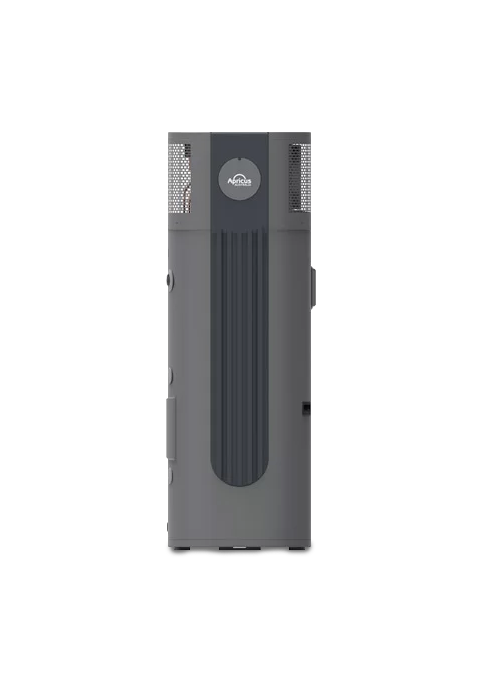
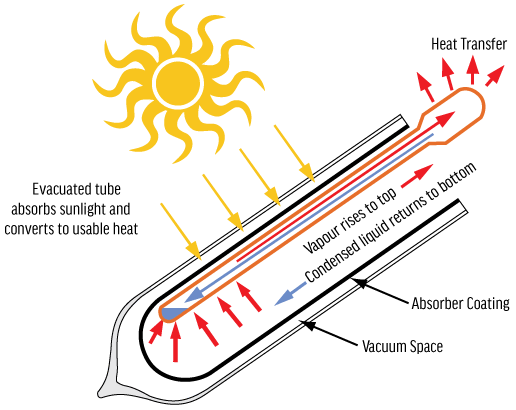
Features of Apricus Evacuated Tube
- Efficient evacuated tube collectors maximize solar energy capture.
- Versatile for various applications, residential, and commercial use.
- High energy output in all weather conditions.
- Durable materials withstand extreme weather and temperatures.
- Modular design for easy customisation and scalability.
- Minimal maintenance required for long-term efficiency.
- Environmentally friendly, reduces carbon footprint and energy costs.
Government Rebates
The Federal Government offers the STC rebate for solar hot water systems, the same system that is available for solar power installations. Then some state governments may offer other incentives. These rebates can change from time to time and state to state. If you would like information regarding your eligibility for rebates, get in touch with our team.
Replacing an existing electric water heater to an Apricus 30 tube Solar Hot Water System is equivalent to planting 240 trees and reduces as much greenhouse pollution as taking one car off the road each year.
The Victorian Government is also offering a hot water rebate under their Solar Homes Program. For more information, head to our rebates page, or to https://www.solar.vic.gov.au/solar-hot-water-rebate or simply call us on (02) 6016 5711, and we will be able to discuss what your options are.
FAQs
How long does a heat pump hot water system last?
The longevity of a heat pump hot water system hinges significantly on model purchased and the overall maintenance. regime With regular upkeep, these systems can expect an average lifespan of 10 to 15 years, demonstrating their durability when subjected to proper care and attention.
Factors influencing the lifespan
The specific model of a heat pump hot water system plays a pivotal role in determining its lifespan. Different models are engineered with varying degrees of durability and efficiency.
Higher-quality models, which do also cost a little more often incorporating advanced features and tend to exhibit a longer lifespan compared to their counterparts. Carefully evaluating the specifications of a chosen model provides valuable insights into its expected longevity. Here at Solar integrity we can advise you on a range of heat pump models.
Another factor influencing the lifespan of a heat pump hot water system is its usage patterns. Systems subjected to heavy usage, such as those in larger households with high hot water demands, may experience a slightly shorter lifespan.
Conversely, systems in smaller households with moderate usage patterns may see their lifespan extended. Understanding the correlation between usage patterns and system longevity allows users to make informed decisions based on their specific needs.
Mitigating negative factors
Routine maintenance emerges as a proactive measure to extend the lifespan of a heat pump hot water system.
Regular checks on components, timely replacements of worn parts, and adherence to manufacturer-recommended maintenance schedules contribute to sustained performance. Engaging in consistent maintenance practices enhances the system’s efficiency and resilience, potentially surpassing the average lifespan.
The installation process itself also plays a role in the long-term performance of a heat pump hot water system. Quality installations conducted by experienced professionals ensure that the system operates optimally from the outset.
Proper sizing, efficient placement, and adherence to installation guidelines contribute to the system’s longevity. Investing in a quality installation sets the foundation for extended lifespan and reliable performance.
Real-world implications
Understanding the average lifespan of a heat pump hot water system has financial implications for homeowners. Factoring in the expected lifespan aids in long-term budgeting and planning for eventual replacements.
While the initial investment in a heat pump system may be higher than traditional alternatives, the extended lifespan and energy efficiency contribute to a favourable return on investment over the system’s operational years.
Considering the environmental impact is another facet of the system’s lifespan. A longer lifespan means fewer units discarded and replaced over time, aligning with sustainability goals.
Heat pump hot water systems, with their extended lifespan, contribute positively to reducing the overall environmental footprint associated with home heating technologies.
How to enhance the lifespan
Adhering to the manufacturer’s recommendations and guidelines is crucial for ensuring the extended lifespan of a heat pump hot water system.
These guidelines often include specific maintenance schedules, usage considerations, and operational best practices. Users can leverage this information to maximise the system’s longevity and mitigate potential concerns.
Engaging with professionals for periodic assessments of the system’s health is a proactive approach to identifying and addressing potential issues.
Professional assessments can detect early signs of wear or inefficiency, allowing for timely interventions that contribute to extended lifespan. Regular check-ups by qualified technicians are an investment in the system’s overall health and performance.
By understanding the factors influencing a heat pumps lifespan, implementing proactive maintenance strategies, and collaborating with industry professionals, homeowners can effectively extend the life of their heat pump hot water systems, reaping the benefits of long-term performance, financial savings, and environmental responsibility.
Do heat pump hot water systems make a lot of noise?
Modern innovative heat pump systems are not only garnering attention for their energy efficiency and environmental benefits but are also dispelling common misconceptions regarding noise levels.
Quiet operation
Solar Integrities heat pump systems are well engineered with a keen emphasis on quiet operation. The design principles underpinning these systems aim to minimise noise levels to a degree that is comparable to everyday household appliances such as refrigerators or air conditioning units.
This intentional approach seeks to provide users with a comfortable living environment without the disruption often associated with older heating technologies.
Comparative noise levels
One benchmark for understanding the noise levels of heat pump hot water systems is the familiar hum of a refrigerator. The intention is to keep the operational sounds well within this range, ensuring that users are not inconvenienced by disruptive noise.
This parallel with the unobtrusive hum of a refrigerator sets expectations for the auditory experience of a modern heat pump system in operation.
Another point of reference is the noise generated by standard air conditioning units. Heat pump systems align their noise levels with this familiar household sound, ensuring that the auditory impact is comparable and, crucially, not a source of disturbance.
The goal is to integrate seamlessly into the ambient soundscape of a home, allowing users to enjoy the benefits of efficient hot water without intrusive noise.
Noise factor
One of the key components influencing the noise levels in a heat pump hot water system is the compressor.
The compressor is responsible for circulating the refrigerant and facilitating the heat exchange process. Modern systems incorporate advanced compressor technologies and sound-dampening features to mitigate noise, ensuring that the operational sounds remain at an unobtrusive level.
The fan, another integral part of the heat pump system, plays a role in dissipating heat and maintaining optimal operating conditions. Like the compressor, the fan operation is designed with a focus on minimising noise.
Variable-speed fans, often employed in modern systems, contribute to quieter operation by adjusting their speed based on the heating demand. This dynamic functionality ensures that the fan operates at the necessary speed without unnecessary noise generation.
Real-world implications
For homeowners contemplating the installation of a heat pump hot water system, the real-world implications of noise levels are paramount. The residential setting demands a harmonious co-existence with household appliances, and heating systems are no exception.
The intentional design features incorporated into modern heat pump systems prioritise residential harmony, allowing users to enjoy the benefits of efficient hot water without the disturbance of excessive noise.
In addition to considerations within the home, the impact on the surrounding neighbourhood is a relevant aspect. Heat pump hot water systems are designed with the understanding that residential areas require low-impact noise solutions.
This consideration aligns with community standards and regulations, ensuring that the adoption of modern heating technologies contributes positively to the neighbourhood environment.
Potential concerns
While modern heat pump hot water systems are engineered for quiet operation, strategic installation can further mitigate potential concerns. Locating the system away from frequently used living spaces or bedrooms can minimise the perception of the actual operational sounds.
Additionally, consulting with professionals during the installation process can provide insights into optimising the system’s placement for both efficiency and minimal noise impact.
Routine maintenance plays a role in ensuring the continued quiet operation of a heat pump hot water system. Regular checks on components, lubrication of moving parts, and prompt resolution of any issues contribute to sustained performance without an increase in noise levels.
Investing in the longevity of the system through proper maintenance practices is a proactive approach to addressing potential noise concerns.
Embracing efficiency
The soundscape of heat pump hot water systems is a far cry from the disruptive noise associated with older heating technologies. Modern systems are intentionally designed to operate quietly in a low level humm, making the operation very rarely an issue.
Can I use a heat pump hot water system with solar panels?
The short answer is – yes, heat pump water heaters are often compatible with solar power systems, making them even more energy-efficient.
In the area of home energy systems, heat pump water heaters and solar power systems often form a symbiotic relationship, working together to enhance overall energy efficiency in the home.
This compatibility paves the way for a dual-energy approach that leverages the strengths of both heat pump technology and solar power, providing homeowners with a sustainable and cost-effective solution for their hot water needs.
Maximising efficiency
The integration of a heat pump hot water system with solar panels contributes significantly to the goal of maximising energy efficiency in residential homes.
By exploiting the abundance of solar energy during daylight hours, the heat pump system can tap into this sustainable source to heat water. This synergy considerably reduces reliance on conventional grid electricity to make hot water, resulting in lower energy bills and a lower CO2 emissions to make hot water.
Compatibility
The compatibility between heat pump water heaters and solar panels stems from their matching goals- one makes renewable energy and the other uses it to make Hot Water.
Heat pump systems excel in extracting heat from the ambient air, with the use of electricity. When coupled with solar power, heat pumps gain access to a clean and sustainable energy source. This collaboration proves particularly effective in regions with ample sunlight, where solar panels can operate at peak efficiency.
Operational harmony
There is an operational harmony between a heat pump hot water system and a solar PV system. When solar power is readily available, the heat pump system draws from this source to heat water. In periods of limited sunlight, the heat pump system effortlessly reverts to conventional electricity, or uses battery power ensuring a continuous and reliable supply of hot water.
Financial advantages
The financial advantages of combining a heat pump hot water system with solar panels shows up in two ways.
Firstly, the reduced reliance on grid electricity translates to lower energy bills. Homeowners can capitalise on the free and abundant energy provided by the sun, leading to substantial long-term savings. Secondly, various Australian governments and utility companies offer incentives and rebates for the installation of renewable energy systems, further enhancing the financial appeal of this dual-energy approach.
Environmental sustainability
The environmental sustainability of utilising a heat pump hot water system with solar panels aligns with broader environmental and financial goals. By incorporating renewable energy sources into daily operations, homeowners actively contribute to the reduction of greenhouse gas emissions. This environmentally conscious approach reflects a commitment to sustainability.
Optimising system design
Optimising the design of a system that integrates a heat pump water heater with solar panels requires careful consideration of factors such as system sizing and configuration.
Professionals in the field can provide valuable insights into tailoring the system to meet specific energy needs and geographical conditions.
A well-designed and properly configured heat pump hot water system ensures optimal performance and maximises the benefits of this solar and heat pump working together approach.
Dual-energy approach
The compatibility of heat pump water heaters with solar power systems presents an unparalleled opportunity to enhance energy efficiency and embrace sustainable practices. This synergy empowers homeowners to harness the power of the sun to heat water, reducing reliance on conventional electricity, lowering energy bills, and minimising environmental impact.
The operational harmony, coupled with financial advantages and environmental sustainability, makes the integration of a heat pump hot water system with solar panels a compelling choice for those seeking a smart dual-energy approach in their homes.
How much money can I save with a heat pump water heater?
The Australian energy landscape has undergone a profound transformation with the introduction of heat pump water heaters. These innovative systems are gaining traction not only for their environmental credentials but also for their potential to slash hot water power bills.
Real savings
The savings achievable with a heat pump water heater do rely on several interrelated factors. One of the primary considerations is the local climate. These systems’ efficiency can vary based on ambient temperature, making regions like Albury-Wodonga and the border region with moderate to warm climates more likely to optimal performance.
Additionally, the efficiency of the chosen heat pump model and the prevailing energy costs in a specific region play pivotal roles in determining the overall savings potential.
Understanding these factors empowers consumers to make informed decisions about the viability of heat pump water heaters for their specific circumstances. By assessing the local climate, the efficiency of the heat pump, and the existing energy costs, individuals can gain valuable insights into the potential financial benefits of adopting this technology.
Comparative savings
The standout feature of heat pump water heaters is their remarkable potential to reduce hot water bills. When compared to traditional electric or gas systems, these innovative heaters can yield savings of up to 75%. This substantial reduction in costs is a strong incentive for Australians looking to cut their power bills significantly without compromising on the comfort of reliable hot water.
The comparative savings underscore the economic advantages of heat pump water heaters. As households seek to manage their budgets effectively, the prospect of a significant reduction in hot water bills positions these systems, especially if combined with a solar system, generates a financially appealing choice.
High efficiency
Efficiency is a crucial aspect of the savings equation when it comes to heat pump water heaters. Modern models are engineered with advanced technology to maximise efficiency by extracting heat from the surrounding air.
This design ensures that a substantial portion of the energy used for water heating is derived from the ambient environment, resulting in tangible savings over time.
Some models also as a refrigerant gas CO2 , which is not Ozone destroying, as many of the earlier traditional heat pump and air conditioning refrigerants.
However, it is essential to acknowledge the influence of the local climate on the efficiency of heat pump water heaters. In medium climate regions, such as Australia, for example compared to Northern Europe, these systems operate more efficiently, harnessing the available heat in the air more effectively.
Understanding this dynamic allows consumers to make realistic estimations of the potential financial benefits based on their geographic location.
An additional consideration in understanding the dynamics of heat pump water heaters is the absence of reliance on traditional fuel sources. Unlike gas systems, which are subject to fluctuating gas prices, and electric systems, which are dependent on grid electricity costs, heat pump water heaters combined with solar operate literally independently of these variables.
This independence contributes to stability in long-term cost projections and enhances the predictability of savings over time.
Long-term rewards
While the initial investment in a heat pump water heater may be higher than that of traditional alternatives, the long-term financial benefits often outweigh the upfront costs.
The potential for substantial savings on hot water bills after a few short years contributes to a favourable return on investment. Individuals are increasingly recognising the value proposition of heat pump water heaters as a sound and economically viable choice for their homes.
Moreover, the financial advantages extend beyond immediate savings. Heat pump water heaters align with environmentally conscious practices by significantly reducing greenhouse gas emissions compared to conventional systems.
This alignment with sustainability goals positions these systems as contributors to a more eco-friendly future, enhancing their appeal to environmentally conscious consumers.
Governments and utility companies in many regions recognise the environmental and economic benefits of heat pump water heaters. Consequently, various incentives and rebates are offered to encourage the adoption of energy-efficient appliances, including heat pumps.
Exploring available incentives can further enhance the financial advantages of making the switch, providing additional support for individuals considering this energy-efficient technology.
Personalised savings
Individual circumstances play a crucial role in determining the actual savings achievable with a heat pump water heater. Customising the approach based on household size, hot water usage patterns, and specific energy needs ensures a more accurate estimation of potential savings.
Engaging with professionals from Solar Integrity can provide personalised insights and quotes tailored to individual requirements.
For example, larger households with higher hot water demands may benefit more significantly from the installation of a heat pump water heater. Understanding the nuances of individual needs allows consumers to optimise the sizing and configuration of their systems, maximising the potential for savings.
By collaborating with industry experts and professionals, individuals can access valuable guidance on selecting the most suitable heat pump model, optimising installation, and maximising energy efficiency. This tailored approach empowers consumers to make informed decisions that align with their unique circumstances and financial objectives.
Conclusion
The question of how much money can be saved with a heat pump water heater is contingent on multiple factors. While the potential for up to a 75% reduction in hot water bills is enticing, understanding the nuances of efficiency, local climate impact, and individual circumstances is essential for a realistic assessment.
The long-term financial benefits, coupled with environmental considerations and available incentives, position heat pump water heaters as a compelling choice for Australians seeking both savings and sustainability in their home energy solutions.
As the adoption of heat pump water heaters continues to grow, households can expect not only a significant reduction in hot water costs but also a contribution to a more environmentally friendly and economically efficient future.
